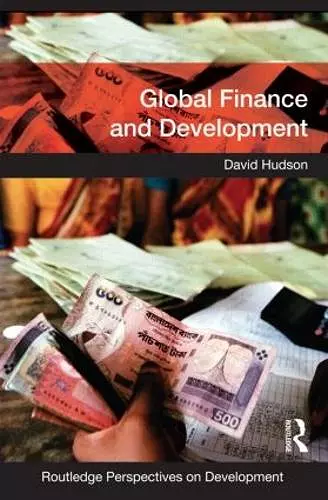Global Finance and Development
Format:Paperback
Publisher:Taylor & Francis Ltd
Published:3rd Dec '14
Currently unavailable, and unfortunately no date known when it will be back
This paperback is available in another edition too:
- Hardback£190.00(9780415436342)

The question of money, how to provide it, and how to acquire it where needed is axiomatic to development. The realities of global poverty and the inequalities between the ‘haves’ and the ‘have-nots’ are clear and well documented, and the gaps between world’s richest and the world’s poorest are ever-increasing. But, even though funding development is assumed to be key, the relationship between finance and development is contested and complex.
This book explores the variety of relationships between finance and development, offering a broad and critical understanding of these connections and perspectives. It breaks finance down into its various aspects, with separate chapters on aid, debt, equity, microfinance and remittances. Throughout the text, finance is presented as a double-edged sword: while it is a vital tool towards poverty reduction, helping to fund development, more critical approaches remind us of the ways in which finance can hinder development. It contains a range of case studies throughout to illustrate finance in practice, including, UK aid to India, debt in Zambia, Apple’s investment in China, microfinance in Mexico, government bond issues in Chile, and financial crisis in East Asia. The text develops and explores a number of themes throughout, such as the relationship between public and private sources of finance and debates about direct funding versus the allocation of credit through commercial financial markets. The book also explores finance and development interactions at various levels, from the global structure of finance through to local and everyday practices.
Global Finance and Development offers a critical understanding of the nature of finance and development. This book encourages the reader to see financial processes as embedded within the broader structure of social relationships. Finance is defined and demonstrated to be money and credit, but also, crucially, the social relationships and institutions that enable the creation and distribution of credit and the consequences thereof. This valuable text is essential reading for all those concerned with poverty, inequality and development.
'For a work of rich scholarship and wide coverage, a fantastic resource for students and teachers, and a breath of fresh air in a very crowded field, look no further than David Hudson’s insightful treatment of the range of issues and debates associated with finance and development. His accessible and engaging style of writing helps to freshen up some long-standing debates, and at the same time to illuminate new arenas of scholarship and offer up-to-date empirical illustrations of the diverse ways in which finance and development are connected. His achievement is to be much admired, and will engage and reward all readers interested in understanding the political economy of development, poverty and inequality in the contemporary world.'
Professor Nicola Phillips, Department of Politics, University of Sheffield, UK
'Global finance and international development are often discussed as if they somehow inhabited different planets, but David Hudson has produced a bold text that explores the many links between them. Yes, aid is one of them and has its chapter. But that is a small part of the overall story, with chapters also on money and the international financial system, bank lending and bonds, portfolio and direct foreign investment, cross-border remittances, and microfinance. In each case the book introduces the technicalities, but also puts them in historical context and draws out the politics behind how money moves and why. In so doing the mantra that finance is invariably good for development is repeatedly exposed as dangerously simplistic at best. Hudson carefully reviews past and present controversies of global finance from neoliberal, liberal institutional, critical reformist and radical perspectives, inviting and empowering readers to make their own judgements. No other text that I know of so effectively informs and stimulates critical reflection on the different ways in which global finance influences poverty and wealth.'
Professor James Copestake, Department of Social and Policy Sciences, University of Bath, UK
ISBN: 9780415436359
Dimensions: unknown
Weight: 600g
382 pages